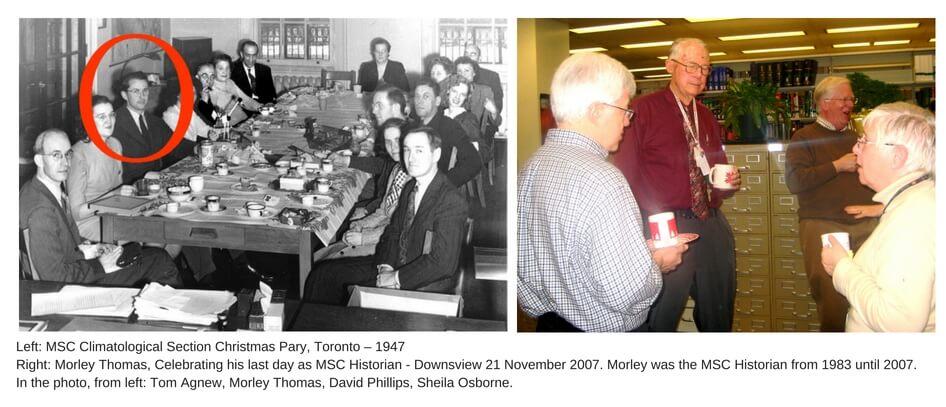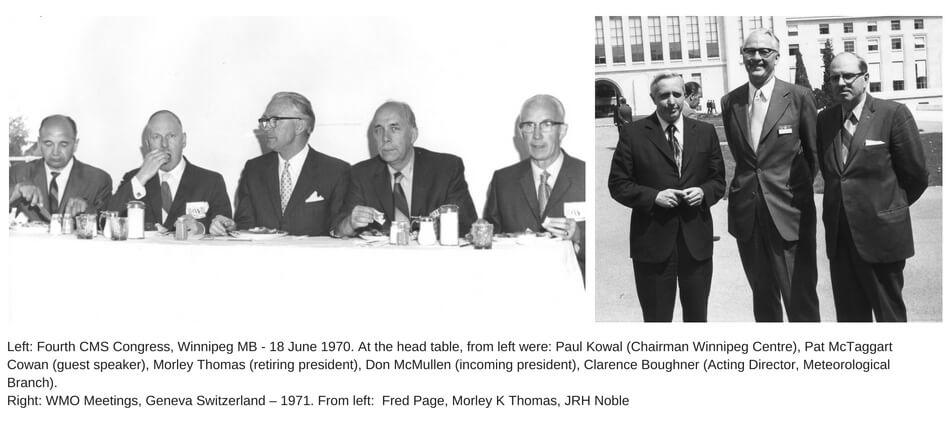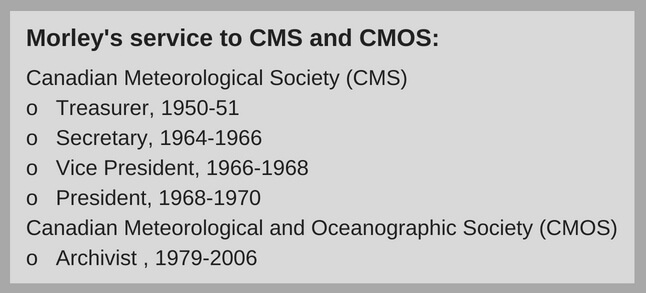
The Passing of Morley Thomas 1918-2018
– By David Phillips, Climatologist and Author –
Morley Thomas, affectionately known as Canada’s Mr. Climatology, died on March 31, 2018 in Watford, ON a few weeks after a fall and successful surgery on a broken hip. International meteorology lost a leader and skillful diplomat; Canadian meteorology lost a staunch and vigorous supporter over 65 years; and I lost a dear friend and remarkably generous mentor.
Traditionally, climatologists think over centuries of time, so it’s only fitting that Morley lived in his 100th year. He was born in Talbotville, ON. Sadly, his father died six weeks later from the Spanish flu pandemic that killed 50 million people around the world. His loving mother, grandparents and many aunts and uncles raised him in a farm community near St. Thomas. He deeply knew and loved southwestern Ontario where he returned to live in retirement. Morley would always let you know the height of the corn and hay in Elgin and Middlesex counties. He was schooled and home-schooled and entered St. Thomas Collegiate Institute where he excelled at mathematics and sciences and football. After high school he contemplated civil engineering at Queens University, but was dissuaded by a teacher who claimed that to be a “dead end”. After all he said, “All the railways and bridges in Canada have been built”. He entered the University of Western Ontario on scholarship to study mathematics with a focus on actuarial sciences and a “major” in football. His love of the gridiron culminated in Western winning the Yates Cup (Senior Inter-Collegiate championship) in 1939 during an era of leather helmets and no face guards. On graduation in 1941, he tried insurance with London Life for four months but with the war underway and having trained as a sergeant in the artillery with the Canadian Officers Training Corps, he patriotically joined the Royal Canadian Air Force as a civilian meteorologist. Following a 15-week course he was posted to a RCAF Service Flying Training School in Dauphin, MB, then Dunnville and Kingston ON. As a “metman” Morley analyzed weather maps, wrote and issued weather forecasts and briefed student pilots and aircrew in the British Commonwealth Air Training Plan. Following the war in 1945, Morley requested and accepted a posting in climatology at meteorological headquarters in Toronto under the tutelage of Clarence Boughner. Climatology was a surprise choice given that most meteorologists saw climatology a dull, boring terminal subject. Instead, Morley saw it as fascinating and an exciting opportunity, although he never lost his love for analyzing daily weather maps. In 1949, he earned his master’s degree in physics (meteorology) from the University of Toronto and returned to climatology.
Morley The Climatologist
From 1951 to 1953, he was seconded to the National Research Council’s Division of Building Research in Ottawa, where he produced the first Climatological Atlas of Canada and provided practical climate guidance and advice to those in building and construction, thus beginning regular climatological inputs and updates to the National Building Code. Following his stint at Building Research, Morley devoted his energies to the development of operational climatology – expanding observational networks and experimenting with machine processing. He worked tirelessly and often anonymously to ensure that weather observations, comprising billions of data from thousands of observing sites, were properly quality controlled and housed in an archive for easy retrieval. Morley knew well that the observational record was the lifeblood of a climatologist and the foundation of all climate services and sciences and one of the principal responsibilities of a national weather service.
Over the next two decades and more, Morley rose through the various senior positions in the Canadian weather service. As Director-General of Central Services he was responsible for computing services, instrumentation, training and ice services. He was a major force behind the Canadian Climate Program – a comprehensive national initiative bringing together all levels of government, the universities and the private sector to make the best use of climatic information. And while not the founding director of the Canadian Climate Centre, he probably should have been, he was its principal architect. In 1979, he became DG of the Canadian Climate Centre – the focal point for climate applications, services, monitoring and research in Canada and from which he retired in 1983.
International Activities
His work as a climatologist took him around the world. At least a dozen foreign governments including Nigeria, Caribbean nations, Mexico, and Bulgaria, sought his advice in setting up a progressive climate service. He gave long and distinguished service to the various World Meteorological Organization technical commissions, boards and committees, especially those related to climatology. He represented Canada at six sessions of the WMO Climate Commission and served for 10 years as Chairman of the Working Group on Climatic Atlases and Technical Regulations.
1978 was a pivotal year for Morley. Owing to reorganization of the weather service, he no longer had responsibility for climatology. He was contemplating retirement. And in April, he headed to Europe as the Canadian principal delegate to the Commission for Climatology (CCl) expecting this would be his last international meeting on the Commission. There was serious consideration in WMO for ending the Commission and distributing its terms of reference amongst the other commissions. In Geneva, delegates spoke of their demise. In backrooms, a ground swell formed to draft Morley as President. He resisted but delegates from every WMO region persisted. Impelled by an unconstrainable sense of duty, he agreed and was elected unanimously. Morley went to work to save climatology internationally even though he had no responsibilities for climatology at home. Soon the World Climate Conference took place and the World Climate Programme was launched. Through his leadership and quiet charm, he returned the Commission to its important place in the history and life of WMO. He was an exceptional and much beloved president providing vigorous leadership and diplomacy at a critical time. The distinguished American climatology Helmut Landsberg described Morley’s leadership in international meteorology as “a model for the cooperative efforts needed in multinational organizations”. Climatology was coming to the fore and being increasingly recognized by those outside climatology/. Morley would never say he saved climatology but there is no question he kept it alive until others discovered and developed the important environmental and global issue it was to become.
A second term as President was almost automatic, but Morley shocked delegates at CCl-IX in Washington when he declined the presidency. Morley had other things in mind – retirement and writing the history of Canadian meteorology − something he had been anxiously looking forward to for 30 years.
Honours
Numerous awards have recognized Morley’s contributions. He was awarded the Patterson Medal in 1981, Canada’s highest meteorological award. In 1985, Morley was selected as the Massey Medalist by The Royal Canadian Geographical Society in recognition of his “substantial personal contributions to the advancement of Canadian climatology and his leadership in international meteorology”. Morley stood astride climatology and geography. Geographers always thought him as one of them. Geographers especially admired his work delimiting the regional climates of Canada. For 20 years, he taught geography and climatology to Canadian meteorologists-in-training. He had hoped to attract meteorologists into climatology not as an opportunity to avoid shift work, but as he saw it − a sense of duty and devotion. The Massey Medal was presented to Morley by The Rt. Hon Jeanne Sauvé, former Minister of the Environment, and Canada’s Governor General at a formal ceremony at Rideau Hall. On his retirement in 1983, Morley was the first recipient of the Morley K. Thomas Long Service Award for continuous volunteer weather observing over 30 years or more. It was only fitting because for 32 years he took daily weather readings at Toronto-Sunnybrook — the remarkable little weather station in the Thomas’ backyard on Lewes Avenue. In 2016, Morley was present in Downsview at a ceremony when MSC’s special collection and hard copy history archives was named the Morley Thomas Meteorology History Archives.
Morley was a vigorous supporter of Canadian meteorology both as a member and frequent guest speaker at the Canadian Branch of the Royal Meteorological Society, the Canadian Meteorological Society (CMS), and Canadian Meteorological and Oceanographic Society (CMOS). He served on their executives and committees including President of CMS from 1968 to 1970. He was the first Life Member and Fellow of CMOS. He was also a fellow of several organizations including the American and Royal meteorological societies, the Royal Canadian Geographical Society, the Canadian Association of Geographers and the Canadian Society of Agro-Meteorology. While he appreciated the recognition, he was uncomfortable discussing it, only when the contribution of others was included.
Morley The Historian
Morley “retired” as a paid public servant on Monday January 31, 1983. On Tuesday morning, he set up shop in the Downsview library as the Service’s unofficial historian and began in earnest his labour of love researching and writing the history of the Canadian weather service. He remained in that volunteer role for over 25 years. At about the same time, he was named the CMOS archivist and continued to write articles on the history of the Society.
Morley always had a deep appreciation for history. His interest in service history began in the 1970s when he noticed that the department was about to toss some century-old correspondence. Realizing their historic value, he salvaged the documents. But before he could put pen to paper, he methodically began the painstaking work of compiling, organizing, documenting, appending and cataloging two centuries of historical documents including thousands of pieces of correspondence dating back to pre-Confederation and through two world wars. Also part of the paper archives were the annual record of operations, diaries, data logs, financial ledgers, personal records of employees, acts from parliament, position papers, oral histories, internal memos, minutes of meetings, organizational charts, maps, blueprints, photographs, newspaper clippings, and much more. No emails or tweets, but everything else.
Once having organized the written record he set out to write the first volumes of the weather service story. Morley told it brilliantly in three wonderful, highly acclaimed volumes. Jim Bruce called them fascinating. When one peruses his works, one is so impressed with the rigour and the meticulous care in which he documented the past record. Morley’s gift for language and love for history permeated his writings – scientific, popular and bureaucratic – and in his conversations too. He was a wonderful storyteller and very insightful man. We were mesmerized at coffee break by his stories, and the only time you would interrupt him was when he said, “Back in ’88 – and you’d interject was that in 1888 or 1988. And he would continue.
In addition, Morley authored several other books in retirement, including a volume on the development of climate observing in Canada for the National Museum of Science and Technology, and a book on the history of the Commission for Climatology for WMO. Further, he published books on local histories on his home town and counties, a modest autobiography “Well Weathered: My Sixty-five Years in Meteorology” and volumes on his family and his wife’s.
Morley Thomas was Canada’s foremost authority on climatology spanning a paid and volunteer career of 65 years. He was held in very high esteem in Canada for his many contributions by people who had never met him. He authored more than 100 publications including articles and reports, books and atlases and three volumes of the Bibliography of Canadian Climate, essays, and magazine articles on different aspects of Canada’s climate. He co-authored Climate Canada with Kenneth Hare, a textbook widely used in high schools and universities. His writing was never dull and more reflected his enthusiasm and the importance of the subject.
Morley contributed to the advancement of the science and services in climatology in several ways, nationally and internationally. He helped transform climatology from its classic, bookkeeping function to one based firmly on physical scientific principles. Through his lucid descriptive climatographies, he defined Canada’s many climates for all to appreciate and understand. He promoted climatology as an applied discipline for the betterment of society. He understood the enormous potential of yesterday’s “spent” weather observation as a way of transferring data into information and in doing so he furthered the practical side of climatology making life safer, more secure and more comfortable for all. He popularized climate change beyond the realm of academia by making others see it as one of the most important environmental issues that human kind has ever faced. Through his efforts in establishing the Canadian Climate Program and the World Climate Programme, he ensured that world leaders, albeit all but one, would be compelled to discuss the implications and necessary remedial actions to a changing atmosphere. And lastly, he carefully documented the history of Canadian meteorology and told the remarkable story of a fine organization with dedicated people − one of Canada’s oldest and most respected governmental scientific organizations, one with a very proud history, clear purpose and many remarkable achievements. A story that had to be told. And Morley Thomas told it – brilliantly and proudly.
It was only fitting that in 2015, the federal government changed the name of the Department that Morley helped create and organize and retire from, to Environment and Climate Change Canada. He lived to see that happen. It must have given him enormous satisfaction, if not delightful revenge.
On a more personal note, I knew Morley for over 50 years. He was a wonderful person. He was tall with barely a pause in his giant stride, and with a bouncing laugh that would fill a room. He had a Jean Beliveau-like personality always encouraging never judging. He always had time to read what you had written and return it promptly with encouraging words. That Morley Thomas was a superb climatologist and serious historian, there is no question. But just as importantly, he was a caring, gentle and modest man and a decent and sensitive human being. I will forever remember him that way.
A Celebration of Life Ceremony for Morley is being held on Sunday Aug 19, 2 pm, at Talbotville United Church (5 minutes south of the 401 on Highway 4). RSVPs to Steve Thomas, SteveT@stephenthomas.ca
More on Morley Thomas, in the following obituaries:
http://v1.theglobeandmail.com/servlet/story/Deaths.20180406.93400684/BDAStory/BDA/deaths
https://strathroyfuneralhome.com/tribute/details/4507/Morley-Thomas/obituary.html
climatology, David Phillips, Morley Thomas, obituary, Patterson Medal



